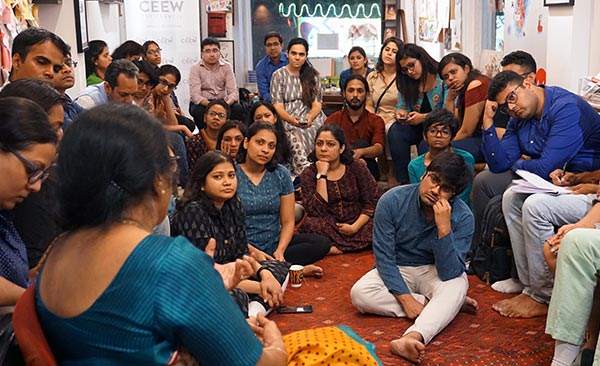About the Event
On the eve of World Environment Day 2019, the Women in Sustainability (WiS) Initiative at CEEW hosted a dialogue - Breaking Barriers and Building Careers for Women in Sustainability - which focused on the best practises to resolve implementation challenges in creating gender sensitive workspaces within the public policy sector. It marked the second anniversary of the Women in Sustainability initiative at CEEW.
Key Highlights
Session I: Panel discussion
Each panellist discussed their unique experiences as employees, administrators, managers, mothers, spouses, and decision-makers, and shared learnings to inspire gender parity in workspaces. Here are the key takeaways:
- Most workplaces continue to be dominated by men because of a skewed representation of women in educational institutions and women quitting their jobs to fulfil family obligations.
- Current work culture and policies largely cater to men. For example, networking meetings take place mostly after work, biases exist against women due to the recent MeToo movement, and maternity leave is perceived as a financial burden on the company.
Retaining women in the workforce:
- Daily issues women face ranges from menstrual cramps to child care. Organisations need to study support systems and come up with solutions.
- Given that many women are forced to leave the workforce right after childbirth, organisations must provide flexibility in time and place of work to help new mothers with child care, over and above the six months of maternity leave.
- Gender neutral policies are imperative to promote equality at workplaces. For example, a company should offer parental leaves and not just maternity leaves. Policies should be in place to protect men and women alike from sexual harassment at workplaces.
- Regular gender audits should be conducted to assess if a workplace is gender neutral and women friendly. Measurement of gender-based key performance indicators of organisations are required.
- Workplaces should create “safe spaces” such as women's caucus for women to discuss challenges they face. In addition, regular gender sensitisation seminars and workshops must be conducted.
- It is imperative to fight inherent biases existing in the sector by encouraging more women to participate in external meetings.
- Women need to help each other, whether within an organisation or outside. One way of doing this is through mentorship.
Session 2: Breakout Session
At the breakthrough session, the audience was divided into smaller groups and given with three discussion themes:
- How to address the work-life imbalance caused by cultural and professional expectations?
- How to ensure retention of more women in the sector to address the “Hollow Middle”?
- How to identify and address the subtle gender biases at the workplace?
The discussion between the groups focused on finding solutions to some of the pressing issues regarding enabling policies and culture to retain women in the sustainability sector. The groups were provided with context notes and discussion questions to help stimulate discussions which resulted in solutions. Here are the key highlights from the breakout session:
- A tax incentive can be created to encourage more women job applicants
- Women should be provided with options to relocate within an organisation
- The performance pay component in the salary should be reduced
- Gender sensitisation programs should be conducted for all employees
- An organisation needs to have an enabling environment in which both men and women to share their issues.
- Mentors and ICC members are to be sensitised and trained to create a conducive environment for both men and women
- Encourage mentorship of young women employees during the early stages of their careers
- Overcoming societal bias and encouraging more male employees to use childcare facilities and work from home to take care of their children will be a step in the right direction. Paternity leave policies should be equal and mandatory.
- Job openings and descriptions should be gender neutral.
- Mainstreaming gender-related work of an organisation across all platforms might help in creating awareness.
- Donors should make mandatory provisions for gender mainstreaming within projects.
About Women in Sustainability
CEEW in collaboration with the United Nations launched WiS initiative in 2017. WiS hopes to expand the conversation around affirmative action to foster enabling work environments for women in sustainability and public policy. We hope that through collaborative partnerships, with like-minded individuals and institutions, this initiative can be nurtured for building a gender diverse workforce in the sustainability sector. You can read more about our work here. In the last couple of years, we have started conversations within and outside CEEW to reinforce the need for gender equality in the workplace, not just in numbers but also in the quality of involvement of women in key areas of research and implementation.





